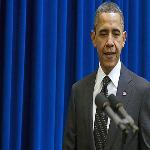15 December 2010

Photo: AFP
US President Barack Obama arrives to speak about the tax legislation working its way through Congress during a statement in the Eisenhower Executive Office Building adjacent to the White House in Washington, DC, Dec 15, 2010
The U.S. Senate has overwhelmingly approved a sweeping federal tax bill that will swell America's national debt by hundreds of billions of dollars and, it is hoped, stimulate a lagging U.S. economy. Attention now shifts to the House of Representatives, where some Democrats want to alter the tax deal struck between President Barack Obama and congressional Republicans.
In a rare show of bipartisanship, the Senate voted 81 to 19 to extend existing federal tax rates for all income levels. Those tax rates are set to rise beginning next year - an outcome neither party wants at a time of chronic economic weakness. The bill also extends federal jobless benefits, limits inheritance taxes on multi-million-dollar estates, and trims worker payroll contributions to Social Security. The bill would increase spending and shrink revenue, sharply boosting federal indebtedness over the next two years.
A common refrain from liberal and conservative senators alike: The tax deal is flawed, but better than doing nothing.
Republican Senator Jon Kyl of Arizona said, "Nobody thinks this is a perfect bill."
The senator explained his "yes" vote this way: "While any increase in the deficit is unwelcome, the overall merits of this bill, including preventing a massive tax increase - one for each and every taxpayer - outweigh [concerns about] that deficit increase, in my opinion."
At the other end of the ideological spectrum, California Democratic Senator Barbara Boxer said dire economic conditions make the tax deal necessary. "I voted for this bill because I think our economy continues to be in a fragile state when it comes to job growth."
A handful of Republicans who opposed the deal objected to extending unemployment benefits without corresponding cuts in spending to offset the cost.
Meanwhile, Independent Senator Bernie Sanders of Vermont voted "no" to protest what he sees as tax giveaways for the super-rich. "We are in the process of providing huge tax breaks to the wealthiest people in this country, to drive up the national debt, which our kids and grandchildren will have to pay off."
Sanders was one of several senators to offer amendments ahead of the vote, none of which were adopted.
The House of Representatives also is expected to vote on the tax package, but it is not clear whether the chamber will alter the bill as it currently exists. Any changes would send the package back to the Senate for another vote.
Economists view the tax bill as stimulative, and some forecasters say the package could boost U.S. economic output by one percentage point next year. But it will add to America's trillion-dollar federal deficit at a time when polls show Americans worried about soaring U.S. national debt.
While voting for the tax bill, Virginia Democratic Senator Mark Warner said Congress must address the fiscal imbalance. "It is time for us in the Senate, and excuse the language, to put up or shut up [act or be silent]. We can do short term stimulus now, but next year engage in meaningful tax reform and deficit reduction."
President Obama has championed the tax bill as an imperfect, but necessary bipartisan compromise to fuel economic growth. If enacted, the measure effectively postpones thorny tax issues until 2012, when Mr. Obama presumably will be running for reelection, and Republicans hope to take control of both the White House and the Senate.